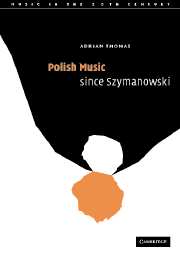Book contents
- Frontmatter
- Contents
- List of musical examples
- Preface
- Acknowledgements
- List of abbreviations
- Part I The captive muse
- Part II Facing west
- Part III The search for individual identity
- Part IV Modernisms and national iconographies
- 11 Pursuing the abstract
- 12 Music and symbolism I: sacred and patriotic sentiment
- 13 Music and symbolism II: vernacular and classical icons
- 14 Emigré composers
- 15 Young Poland
- Part V Postscript
- Appendix 1 Cultural events in Poland, 1953–6
- Appendix 2 ‘Warsaw Autumn’ repertoire, 10–21 October 1956
- Appendix 3 ‘Warsaw Autumn’ repertoire, 1958–61
- Appendix 4 Selected Polish chronology (1966–90)
- Notes
- Select bibliography
- Index
14 - Emigré composers
Published online by Cambridge University Press: 22 September 2009
- Frontmatter
- Contents
- List of musical examples
- Preface
- Acknowledgements
- List of abbreviations
- Part I The captive muse
- Part II Facing west
- Part III The search for individual identity
- Part IV Modernisms and national iconographies
- 11 Pursuing the abstract
- 12 Music and symbolism I: sacred and patriotic sentiment
- 13 Music and symbolism II: vernacular and classical icons
- 14 Emigré composers
- 15 Young Poland
- Part V Postscript
- Appendix 1 Cultural events in Poland, 1953–6
- Appendix 2 ‘Warsaw Autumn’ repertoire, 10–21 October 1956
- Appendix 3 ‘Warsaw Autumn’ repertoire, 1958–61
- Appendix 4 Selected Polish chronology (1966–90)
- Notes
- Select bibliography
- Index
Summary
The possibility for Polish composers to travel abroad – the immediate period of martial law aside – has been an important feature of Polish musical culture since 1956. Many of those born after the Second World War have studied in Europe or the United States, sometimes on scholarships funded by Lutosławski's Grawemeyer award. One or two have spent extended periods outside Poland, but it is noticeable that the vast majority of this generation still live and work in their native country. The same is not true of those born between the wars. Bujarski, Kotoński and Stachowski are firmly rooted and receive most of their performances at home, while a few – like Górecki and Kilar – combine an international presence with a wish to live and compose in Poland. Penderecki is a special case – his output is predominantly commissioned, premiered and performed outside Poland and he remains the most peripatetic of Polish composers. Lutosławski had a similar international trajectory, although he had a settled home in Warsaw. There is, however, a large group of composers, mainly born between the mid-1920s and mid-1940s, who have moved abroad (some for political reasons), usually to take up teaching positions. These include Dobrowolski (Graz, 1976), Meyer (Cologne, 1987), Ptaszyńska (USA, 1972), Schaeffer (Salzburg, 1986) and Szalonek (Berlin, 1973), all of whom have disseminated many important aspects of contemporary Polish music not embodied by composers with higher international profiles.
- Type
- Chapter
- Information
- Polish Music since Szymanowski , pp. 283 - 288Publisher: Cambridge University PressPrint publication year: 2005



